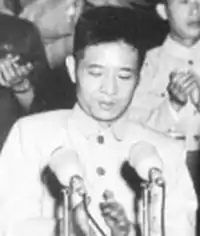Hu Yaobang
Hu Yaobang (20 November 1915 – 15 April 1989) was a Chinese politician and a high-ranking official of the People's Republic of China.
Hu Yaobang | |
|---|---|
胡耀邦 | |
 Hu Yaobang in 1953 | |
| General Secretary of the Communist Party of China | |
| In office 11 September 1982 – 15 January 1987 | |
| President | Li Xiannian |
| Premier | Zhao Ziyang |
| Preceded by | Post reestablished |
| Succeeded by | Zhao Ziyang |
| Chairman of the Communist Party of China | |
| In office June 28, 1981 – September 11, 1982 | |
| Deputy | Ye Jianying |
| Preceded by | Hua Guofeng |
| Succeeded by | Post abolished |
| Secretary-General of the CPC Central Secretariat | |
| In office February 29, 1980 – September 12, 1982 | |
| Chairman | Hua Guofeng Himself |
| Preceded by | Deng Xiaoping (in 1966) |
| Succeeded by | Post abolished |
| Personal details | |
| Born | 20 November 1915 Liuyang, Hunan, Beiyang Government |
| Died | 15 April 1989 (aged 73) Beijing, China |
| Nationality | Chinese |
| Political party | Communist Party of China |
| Spouse(s) | Li Zhao |
Hu Yaobang was a political ally of Deng Xiaoping. They fought together in the Chinese Civil War. Both were part of the communist force that took power of Sichuan in 1949. Hu became the leader of the Communist Youth League from 1952–1966.
During the Cultural Revolution, Hu Yaobang was said to not be true to the Communist Party of China and Mao Zedong. He was rehabilitated twice. He was an important supporter of Deng Xiaoping's rise to power.
Hu Yaobang's death in 1989 was a cause for the Tiananmen Square protests.[1]
References
- Schiavenza, Matt (16 April 2014). "China's Forgotten Liberal Hero". The Atlantic. Retrieved 20 September 2016.
This article is issued from Wikipedia. The text is licensed under Creative Commons - Attribution - Sharealike. Additional terms may apply for the media files.